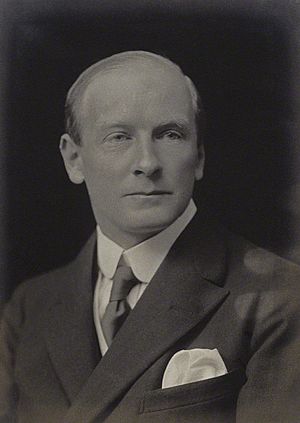Alexander Shaw, 2nd Baron Craigmyle facts for kids
Quick facts for kids
The Lord Craigmyle
|
|
|---|---|

Alexander Shaw
|
|
| Member of Parliament for Kilmarnock Burghs |
|
| In office 1915–1918 |
|
| Preceded by | Will Gladstone |
| Succeeded by | Constituency abolished |
| Member of Parliament for Kilmarnock |
|
| In office 1918–1923 |
|
| Preceded by | New constituency |
| Succeeded by | Robert Climie |
| Personal details | |
| Born | 28 February 1883 |
| Died | 29 September 1944 (aged 61) |
| Spouse | Lady Margaret Cargill Mackay |
| Children | 4 |
| Parents |
|
| Relatives | Thomas Shaw (son) |
| Alma mater | Trinity College, Oxford |
| Occupation | Lawyer |
| Military service | |
| Branch/service | Royal Marines |
| Battles/wars | Battle of the Somme |
Alexander Shaw, 2nd Baron Craigmyle (born February 28, 1883 – died September 29, 1944) was an important Scottish politician. He was a member of the Liberal Party.
About Alexander Shaw
Alexander Shaw started his career as a lawyer. He studied at Trinity College, Oxford, a famous university. In 1905, he was even the President of the Oxford Union, which is a well-known debating society. He officially became a lawyer in 1908.
In 1913, he married Lady Margaret Cargill Mackay. They had four children together: one son and three daughters.
During the First World War, Alexander Shaw served in the Royal Marine Artillery. He was part of the Battle of the Somme, a very big and important battle.
Outside of his political work, he held other big jobs. He was a director at the Bank of England, which is a major bank. He also chaired the P & O, a large shipping company.
Alexander Shaw's father was Thomas Shaw, 1st Baron Craigmyle, who was also a very important lawyer. When his father passed away in 1937, Alexander inherited his father's special title, becoming the 2nd Baron Craigmyle.
Alexander Shaw passed away in 1944 when he was 61 years old. After his death, his only son, Thomas Donald Mackay Shaw, inherited the title.
His Time in Parliament
Alexander Shaw became a Member of Parliament (MP) in 1915. An MP is a person elected to represent a group of people in the country's government, called Parliament. He was elected without anyone running against him in a special election called a by-election for the area of Kilmarnock Burghs.
He kept this seat until 1918, when the Kilmarnock Burghs area was changed. For the 1918 general election, he was elected for the new area called Kilmarnock. He won again as a Liberal in the 1922 election.
On November 12, 1923, Alexander Shaw decided to leave his role as an MP. He did this by taking a special, old-fashioned job called "Steward of the Chiltern Hundreds." This is a way for MPs to officially resign from Parliament. Because he left, no special election was held to replace him. The seat stayed empty until Parliament was officially ended on November 16 for the 1923 general election.
 | Claudette Colvin |
 | Myrlie Evers-Williams |
 | Alberta Odell Jones |

